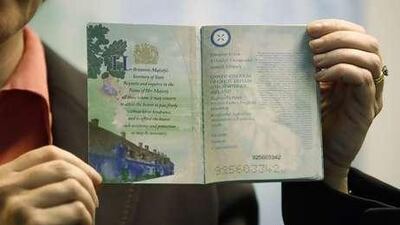DUBAI // Authorities in Dubai yesterday welcomed the UK's decision to boost anti-forgery features in its passports, seven months after fake British travel documents were used in the assassination of the Hamas official Mahmoud al Mabhouh in the emirate.
Brigadier Obaid bin Suroor, the deputy head of the Dubai Naturalisation and Residency Department, applauded the move and added that the measures would be supported by further training for Dubai's passport control staff. "We welcome any new technology that would prevent any country's passports from being forged and make them more secure," he said. "We will have to give training to our staff on how to better detect forgery on those passports and we will also introduce any new technology needed towards that end."
The passports were announced on Wednesday and will include additional holograms, complex artwork and "physical security measures" to counter forgers. They will be issued to UK citizens throughout the world from October 5. A biometric data chip - introduced into UK passports in 2006 - will also be put inside the front cover of the passport. Attempts to tamper with the chip in its new location will risk damaging the passport to the point where it becomes unusable.
The UAE has had first-hand experience of the threat posed by fake British travel documents. Fourteen of the individuals implicated in the assassination of the Hamas chief al Mabhouh, who was murdered in his Dubai hotel room in Al Bustan Rotana on January 19, travelled to the UAE on fake or cloned British passports. Ellen Miller, a press officer for the UK Home Office, denied a direct link between the murder of Mr al Mabhouh and the heightened security features.
"It is something that we do quite frequently, it was in the pipeline anyway. It's not one thing that it is the result of, it is part of a strategy to stay ahead of any possible fraud," she said. During a press conference to unveil the travel document, Sarah Rapson, the chief executive for the Identity and Passport Service, an agency within the Home Office, noted that UK passports have been targeted by criminals.
"The British passport, of course, is one of the most secure, highly respected international travel documents. Because of that, it's a target for fraudsters who seek to tamper with or to copy the document to create false identities for criminal purposes." The changes were designed by De La Rue, which, in addition to creating and printing the new UK passport, also prints banknotes for the Bank of England. The company will also be in charge of inserting individual information on to the new passports.
Claire Burrows, the marketing manager for identity systems at De La Rue, said that not all of the features will be made public, with most under wraps until the official release in October. She added that the passport will contain "lots of enhanced physical security features. The design is intricate with layerings of security". The new design will include scenes from the British countryside, which are both visually appealing and composed of several elements, in an effort to foil would-be counterfeiters.
"This layering, first of all, creates a very beautiful aesthetic effect, but also makes it very secure. The best way to protect any document is to layer security features on top of each other. "It makes it more difficult for people to forge. They may be able to copy one feature, but if they have to copy four features, it makes it more complex." The UAE seized almost 1,100 fake passports in 2008 and 80 per cent of the cases in the State Security Court involve counterfeit passports.
@Email:smclain@thenational.ae

